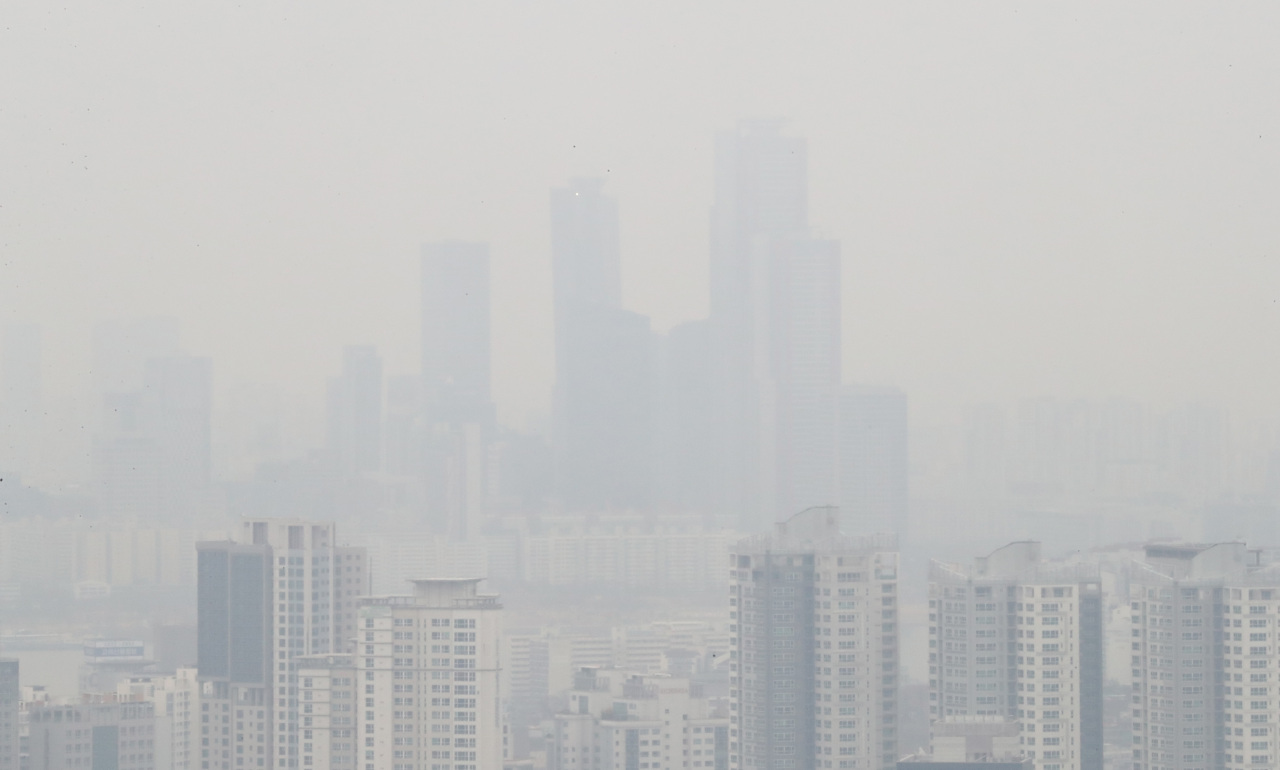Korea’s CO2 emissions fell 6% in 2020 from COVID-19: study
By Ko Jun-taePublished : March 4, 2021 - 15:29

South Korea saw its carbon dioxide emissions fall 6 percent last year, while the global average declined 7 percent due to lockdowns in force because of the COVID-19 pandemic, research showed Wednesday.
According to a study by the University of East Anglia, Stanford University and the Global Carbon Project, COVID-19 pandemic resulted in an unprecedented fall in emissions of around 7 percent, or 2.6 billion metric tons of CO2, from a year earlier to 34 billion metric tons in 2020.
While many studies had predicted that the global CO2 emission levels would fall on a yearly basis last year due to COVID-19, the study is the first to quantitatively observe the emission levels on a global scale and analyze the trend in line with the pandemic.
The research credited the unprecedented drop to widespread disruptions in the transport sector, which radically altered the trajectory of global CO2 emissions.
While 36 high-income economies cut their CO2 emissions by an average of 0.8 percent each year from 2016 to 2019, they reported an average fall of 9 percent in 2020.
Ninety-nine middle-income economies, which accounted for 51 percent of all CO2 emissions in 2019, had dragged down their emission levels by an average of 0.8 percent for the four years to 2019, but reported a 5 percent decrease overall last year.
Korea, included in this group, reported a 6 percent drop last year, up five times from the 1.2 percent annual rate of fall over the previous four years. Low-income economies saw their CO2 emission rise 4.5 percent annually until 2019, but inversely reported a 9 percent drop in 2020.
The study said the latest fall is the biggest drop ever witnessed in terms of global annual emissions, but said much more effort is needed to fulfill the Paris Agreement, which asks participating countries to limit global warming to a rise of well below 2 degrees Celsius compared to preindustrial levels.
“Early data suggest economic drivers and other factors were driving global emissions up in December 2020, potentially offsetting the decrease caused by confinement measures,” the study said.
“The disruption of emissions trajectories due to the COVID-19 pandemic means strategic actions now could minimize the rebound and reinforce cuts in global emissions in the long term.”
The research addressed that temporary measures implemented by the pandemic had little impact on the fossil fuel-based infrastructure that sustains the global economy, saying much greater efforts are needed to meet the Paris Agreement.
Before the COVID-19 pandemic, emissions fell in 64 countries but increased in 150 others, growing global emissions by 0.21 billion metric tons a year from 2016 to 2019 compared to 2011-2015 levels.
“To be at the scale necessary to meet climate objectives, such post-COVID-19 actions need to deliver a tenfold increase in emissions cuts compared to those observed during 2016–2019 among decarbonizing countries, and be accompanied by a profound disinvestment in fossil fuel-based infrastructure worldwide,” the study wrote.
By Ko Jun-tae (ko.juntae@heraldcorp.com)
According to a study by the University of East Anglia, Stanford University and the Global Carbon Project, COVID-19 pandemic resulted in an unprecedented fall in emissions of around 7 percent, or 2.6 billion metric tons of CO2, from a year earlier to 34 billion metric tons in 2020.
While many studies had predicted that the global CO2 emission levels would fall on a yearly basis last year due to COVID-19, the study is the first to quantitatively observe the emission levels on a global scale and analyze the trend in line with the pandemic.
The research credited the unprecedented drop to widespread disruptions in the transport sector, which radically altered the trajectory of global CO2 emissions.
While 36 high-income economies cut their CO2 emissions by an average of 0.8 percent each year from 2016 to 2019, they reported an average fall of 9 percent in 2020.
Ninety-nine middle-income economies, which accounted for 51 percent of all CO2 emissions in 2019, had dragged down their emission levels by an average of 0.8 percent for the four years to 2019, but reported a 5 percent decrease overall last year.
Korea, included in this group, reported a 6 percent drop last year, up five times from the 1.2 percent annual rate of fall over the previous four years. Low-income economies saw their CO2 emission rise 4.5 percent annually until 2019, but inversely reported a 9 percent drop in 2020.
The study said the latest fall is the biggest drop ever witnessed in terms of global annual emissions, but said much more effort is needed to fulfill the Paris Agreement, which asks participating countries to limit global warming to a rise of well below 2 degrees Celsius compared to preindustrial levels.
“Early data suggest economic drivers and other factors were driving global emissions up in December 2020, potentially offsetting the decrease caused by confinement measures,” the study said.
“The disruption of emissions trajectories due to the COVID-19 pandemic means strategic actions now could minimize the rebound and reinforce cuts in global emissions in the long term.”
The research addressed that temporary measures implemented by the pandemic had little impact on the fossil fuel-based infrastructure that sustains the global economy, saying much greater efforts are needed to meet the Paris Agreement.
Before the COVID-19 pandemic, emissions fell in 64 countries but increased in 150 others, growing global emissions by 0.21 billion metric tons a year from 2016 to 2019 compared to 2011-2015 levels.
“To be at the scale necessary to meet climate objectives, such post-COVID-19 actions need to deliver a tenfold increase in emissions cuts compared to those observed during 2016–2019 among decarbonizing countries, and be accompanied by a profound disinvestment in fossil fuel-based infrastructure worldwide,” the study wrote.
By Ko Jun-tae (ko.juntae@heraldcorp.com)


![[Exclusive] Korean military set to ban iPhones over 'security' concerns](http://res.heraldm.com/phpwas/restmb_idxmake.php?idx=644&simg=/content/image/2024/04/23/20240423050599_0.jpg&u=20240423183955)

![[Graphic News] 77% of young Koreans still financially dependent](http://res.heraldm.com/phpwas/restmb_idxmake.php?idx=644&simg=/content/image/2024/04/22/20240422050762_0.gif&u=)



![[Pressure points] Leggings in public: Fashion statement or social faux pas?](http://res.heraldm.com/phpwas/restmb_idxmake.php?idx=644&simg=/content/image/2024/04/23/20240423050669_0.jpg&u=)









